Hijab Activist To Serve Over Four Years In Prison
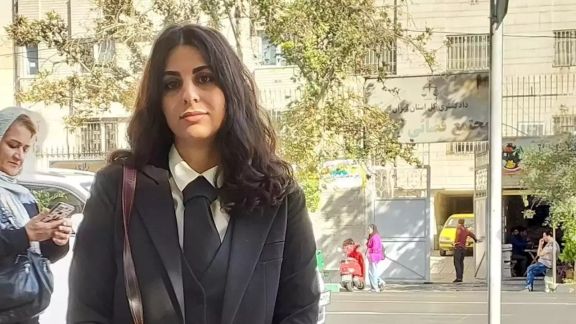
Anti-hijab activist Sepideh Rashno has been sentenced to six months' imprisonment in her latest case amid Iran's hardening hijab laws.

Anti-hijab activist Sepideh Rashno has been sentenced to six months' imprisonment in her latest case amid Iran's hardening hijab laws.
The young woman was denied a presence at her own trial in Tehran after announcing on social media that she would not wear hijab at the court.
She has also been fined 10 million Iranian rials in cash and banned from using Instagram for one year. Her current Instagram page was banned entirely.
It is the hijab rebel's second time in prison, first arrested in July last year after a video of her quarrel with a woman verbally assaulting her for being unveiled on public transport went viral, long before the national uprising of the Women, Life, Freedom movement.
She was later forced into a televised confession, clearly bruised, showing signs of torture. At the time, the US-based Human Rights Activists News Agency said she was taken to hospital with internal bleeding shortly after her arrest and before her appearance on television, when she was covered with her mandatory hijab.
She was released from Tehran’s Evin prison after about 40 days with a bail of what is believed to be $27,000, a huge sum for ordinary Iranians already forced into dire economic straits in a flagging economy.
The young writer and translator was initially convicted of "association and collusion with the intent of endangering national security" and "propaganda against the Islamic Republic," resulting in a five-year suspended prison sentence in December. However, she faced fresh charges of "promoting moral corruption" and "propaganda against the regime" after sharing a photo without hijab on social media.
Rashno revealed on Sunday through her Instagram account that the new sentence effectively ends the suspension of three years and seven months from her initial case. Consequently, she now faces a total of four years and one month of imprisonment.
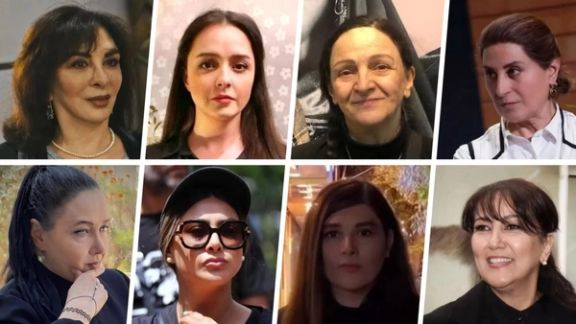
Prominent actresses banned for hijab defiance and supporting protests say not acting is a choice they made to protect their professional dignity before being banned.
“My honor does not allow me to act in [Iran's highly controlled] film industry. Who are you [to ban me]?” Katayoun Riahi said on Instagram in a post that included the photos of the twenty colleagues who were officially banned from acting earlier this week. “I never believed [in the necessity of wearing] the hijab to have ‘removed’ mine now,” she told Iran International TV in November.
“I said goodbye to the world of acting when I was in solitary confinement at Evin prison,” Hengameh Ghaziani, who has also been banned, wrote in an Instagram post. Referring to her interviews with Persian-language media outside Iran, Ghaziani was indicted for “contact with hostile and anti-revolutionary media”.
Pantea Bahram, another banned actress, said in an Instagram story after the release of the list that being banned is the least of her concern, with so many protesters still in prison, and when young girls and boys lost their eyes to the bullets of security forces during the crackdown on protesters in 2022 and 2023.
The ban has met much criticism from others in the film industry. “I feel ashamed of looking at the list in which there are the names of no men. I’m proudly standing with my [female] colleagues until they return [to work],” Mohammad Rezayi-Rad, theater director, announced on Instagram.

Iranian actresses are required to cover their hair in the films they play. The ministry enforces the hijab, as well as censorship of content, by rejecting scripts or modifying them and refusing a public screening license if a film does not meet their requirements.
Banned actresses expressed solidarity with protesters and the anti-hijab movement, often posting photos of themselves without headscarves during last year’s nationwide protests following Mahsa Amini's death in custody.
Riahi, 62, and two other celebrity actresses, Golab Adineh and Fatemeh Motamed-Aria, also showed up with no headscarves at the funeral of popular film director, Kiumars Pourahmad, who tragically ended his own life in April.
Speaking to reporters on the sidelines of a cabinet meeting Wednesday Islamic Guidance Minister Mohammad-Mehdi Esmaili confirmed the ban earlier announced by a ministry official in charge of the film industry.
“We announced before that abidance by the hijab is a legal requirement … I have said several times that those who do not abide by the law cannot work [in the film industry],” Esmaili said.
The list of the banned actresses was released on the same day by the director of the supervision department of the ministry’s Cinema Organization, Habib Ilbeigi.
Some of these celebrities, including Riahi, were arrested for their hijab rebellion. Riahi had to apologize for her defiance under duress during her trial last December. Unable to bear the relentless psychological torment, she passed out and had to be taken to hospital by ambulance. The trial was being filmed, apparently for airing on the state television to discourage others from following suit.
Actresses' open rejection of hijab led to some losing roles in TV sitcoms, the cancellation of entire shows, and censorship of their previous films.
In November last year, House of Cinema, formerly known as the Iranian Alliance of Motion Picture Guilds, said 100 filmmakers and other movie, music and theater personalities had been arrested or banned from work since the Mahsa Movement protests began in mid-September 2022.

To prevent repeat of anti-regime protests like the Mahsa Amini protests, Iranian authorities have imposed a full ban on reporting about Armita Geravand’s death.
Throughout her month-long hospitalization, the media has been prohibited from reporting anything other than the official account of her death, which was first published Saturday morning by the official government news agency IRNA. Most websites Saturday only republished the IRNA report or did not cover it at all, despite its significance.
“They did not allow us report about the child of [our] motherland,” Shargh daily journalist Maryam Shokrani said in a tweet with the hashtag Armita Geravand. This, apparently, was a reference to the ban on reporting on Armita’s case when reporting on children of Gaza being killed by Israel is even encouraged and could be rewarded.
Another journalist, Saeed Arkanzadeh, tweeted that authorities have assumed the role of narrative makers, believing that they control the public opinion by creating their version of a story and amplifying it through their affiliated media to succeed in establishing it as the correct account of an incident. “is it really that simple?”, he asked.
However, authorities seem to have failed to convince most Iranians, who believe hijab enforcers were responsible for her death. Authorities claim her head injury was caused by low blood pressure and fainting.
People took to the rooftops and windows to chant Armita’s name and against the regime. “Down with the girl-killing regime!”, “Down with the Dictator”, and “Death to Khamenei” in the defiant Ekbatan neighborhood in western Tehran, the close-by Chitgar, and some other areas of the city Saturday evening.
Hours after Armita's death was announced, Tehran Prosecutor Ali Salehi initiated legal proceedings against the prominent reformist political commentator Sadegh Zibakalam and two journalists, Sara Massoumi and Milad Alavi, for their social media posts, along with the administrators of a Telegram news channel called Roozarooz.
According to the Revolutionary Guards (IRGC) linked Tasnim and Fars news agencies, the accused could be charged with lying about Armita’s death, presumably regarding its connection with hijab enforcement hijab enforcement, and for casting doubt on the official account.
Zibakalam expressed his hope that Armita's death would prompt the authorities to reconsider their stance on compulsory hijab. He stated, "How many Mahsas and young Armitas must be buried before the authorities accept that they cannot force people to wear the hijab or remove it?"
Sara Massoumi, a former reporter for the reformist Etemad newspaper, tweeted, "They say that you 'passed.' We have known the trail of blood for years. The city smells of the blood of the mistreated. Did they eventually show your mother all the footage?" She was referring to the authorities' pressure on Armita's mother to confirm the official account on television cameras.
The Geravand family, originally from the western Kurdish province of Kermanshah, is under pressure to keep her funeral as low-key as possible. The family's funeral announcement released on Saturday does not include a photo of Armita; instead, it features an image of a white candle and roses with the words "My daughter."
“The women and girls of this land are censored even after their death,” Omid Tousheh, another journalist tweeted referring to the funeral announcement.
Many other Iranians, including some celebrities, have posted condolences to Armita’s family and all Iranians, as well as their own views on the young girl’s death, on social media.
Actress Taraneh Alidoosti, who has been banned from acting for defying the hijab wrote on Instagram that her decision to stop acting in Iranian films is not because she is not allowed to but because she believes that the headscarf actresses are forced to wear in films "is stained with blood." She stated, "I will not wear the scarf that killed my sisters."
Prominent expatriate opposition figures including Nobel Laureate Shirin Ebadi, Canada-based Hamed Esmaeilion, former Crown Prince Reza Pahlavi, and the US-based activist Masih Alinejad have also condemned the state killing of Armita Geravand.
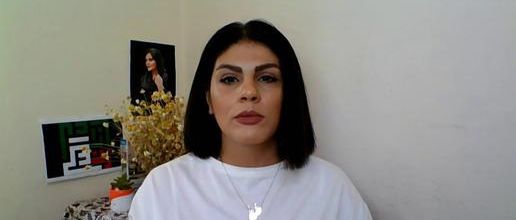
Shilan Mirzaee, a human rights and political activist, is in danger of being deported to Iran because of increased pressure on Iranian asylum seekers in Turkey.
Mirzaee was recently detained in Izmir and transferred to the Bandirma deportation center in northern Turkey.
During an audio message on Thursday, Ms Mirzaee described her situation and stated that if she were to be returned to Iran, she would be subjected to severe punishment.
Attempts to deport her are being made despite her claim that she has "the approval of the United Nations and the Immigration Police" in her file and that she has not engaged in any activities against the Turkish government.
Authorities have not explained why this activist was arrested and transferred to the detention center.
In recent years, the situation of Iranian political and civil refugees living in Turkey has deteriorated.
Shilan Mirzaee has described threats made by individuals associated with the Iranian Embassy, including two women who she alleges were attempting to kidnap her, and threats made against her son in front of school.
Iran International reported in August about the situation of an Iranian refugee in the Aydin Removal Center who was being physically and mentally tortured by the camp director.
He explained that the officials of the camp keep the asylum seekers under the sun so that they will sign the deportation papers to Iran.
Last year British television channel ITV reported that affiliates of the Iranian regime are threatening to kidnap political refugees in Turkey.
An asylum seeker was quoted asserting that Iran has become very adept at kidnapping and killing opponents.
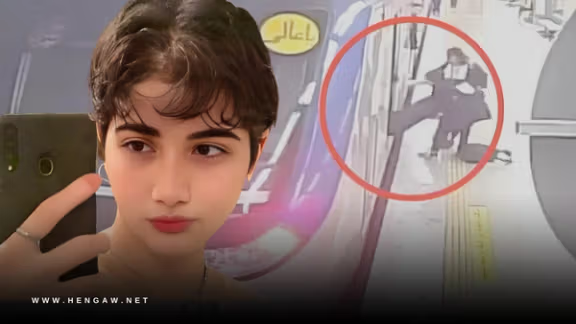
Armita Geravand, a 16-year-old student who suffered a head injury in an encounter with Tehran’s hijab police has passed away in hospital, reports said on Saturday.
On October 1st, Armita, a high school student, fell into a coma after she was stopped by hijab enforcers in Tehran subway. Although, the government prevented any clear information about what took place, but apparently a woman agent pushed her and Armita fell, receiving a severe head injury.
There was a tight police cordon around her in Tehran's Fajr Hospital to prevent photographs or information from reaching the public. Earlier reports in the Iranian state media indicated that the 16-year-old was brain dead.
Earlier, Iran International received information that Armita Geravand's family faced pressure from authorities to relocate her body discreetly from Tehran to Jafar Abad, Kermanshah, in the event of her death, revealing it was at the order of Iran's Leader, Ali Khamenei.
Following the death of Mahsa Amini in September 2022, the Iranian clerical regime is apprehensive about a resurgence of the extended anti-establishment protests and the 'Women, Life, Freedom movement' seen last year.
The circumstances of Geravand's case closely resemble those of Mahsa Amini's death last year while she was in the custody of morality police. In both instances, the regime denied any wrongdoing but pressured the families to refrain from speaking to the media.
The regime's explanation of what caused the death of this teenage girl has been questioned on social media. Many emphasize that she was "killed" by hijab enforcers, much like Mahsa Amini's case, when the government tried to offer an explanation that she had pre-existing health issues, but the public did not believe it.
Information obtained by Iran International had indicated that additional family members and relatives of Armita Gravand had been threatened and are prohibited from discussing her condition with the media.
There were concerns among the Geravand family and their relatives that security agents might have installed eavesdropping devices or cameras inside their residences, causing them to feel unsafe in their own homes.
Moreover, her parents were required to sign a statement committing not to file a complaint against "any individual, organization, or entity."
Her death has triggered a flood of swift reactions from activists, journalists, and others who have turned to social media to protest against the regime and mourn her passing.
Behnam Gholipour, journalist, wrote on X: "The [political] system that killed this sweet girl is the flagbearer for Gaza."
Political commentator Sadegh Zibakalam in Iran also expressed condolences to Armita's family following her passing, saying: "I hope her death will cause the system to reconsider its stance on compulsory hijab. How many Mahsas and young Armitas must be buried before the authorities accept that you cannot force people to wear the hijab or remove it?"
Iran's parliament passed a stringent 'hijab bill' on the first anniversary of Mahsa Amini's death in mid-September, which, if violated, can result in ten years' imprisonment. Women have been required to wear the hijab by Iran's theocratic establishment since 1979, when the secular Shah was overthrown. However, the 'Women, Life, Freedom' movement has permitted more women to appear unveiled in public places, including malls, restaurants, and stores.
In response to the hospitalization of Armita Geravand, Amnesty International has asked the international community to urge the Iranian authorities to allow an independent international delegation, including UN experts, to investigate the incident.
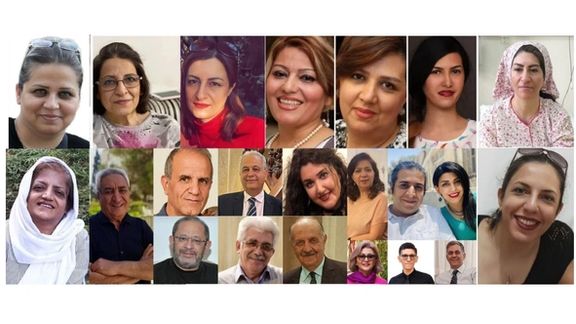
In a surge of persecutions against the Baha'i religious community in Iran, 36 new incidents have come to light in recent days, disproportionately impacting women.
Ten women, many of them young, were apprehended in Esfahan (Isfahan), central Iran, earlier this week, with an additional three arrests reported in Yazd, the Bahai’s International Community reported.
The arrests were marked by home invasions and the confiscation of personal possessions, including electronics, books, cash, and even gold. In a particularly disconcerting instance, more than ten agents were involved in the raid during one woman's arrest.
Each of the arrested Baha'i individuals and the victims of home invasions carried out by the Iranian government has a profoundly personal and harrowing account of persecution that has permeated every aspect of their lives, the statement says.
The recent wave of arrests and harsh prison sentences follows over a year of heightened attacks on Iran's Baha'i community. Dozens of Baha'is have been subjected to arrests, trials, sentencing, or bans from university education and livelihoods in recent months. In August, the Baha'i International Community reported that 180 Baha'is, including a 90-year-old man had been targeted.
Two other Baha'i women, Mahvash Sabet and Fariba Kamalabadi, who had previously endured a decade in prison from 2008 to 2018, were re-arrested in July 2022 and are currently serving a second 10-year jail term.
In Iran, approximately 300,000 Baha'is reside, and they frequently document a pattern of systematic rights violations. The violations encompass harassment, forced displacement from their residences and businesses, and unequal treatment with regard to government employment and access to higher education.